安全科学用药(英文终稿)
- 格式:ppt
- 大小:7.73 MB
- 文档页数:43
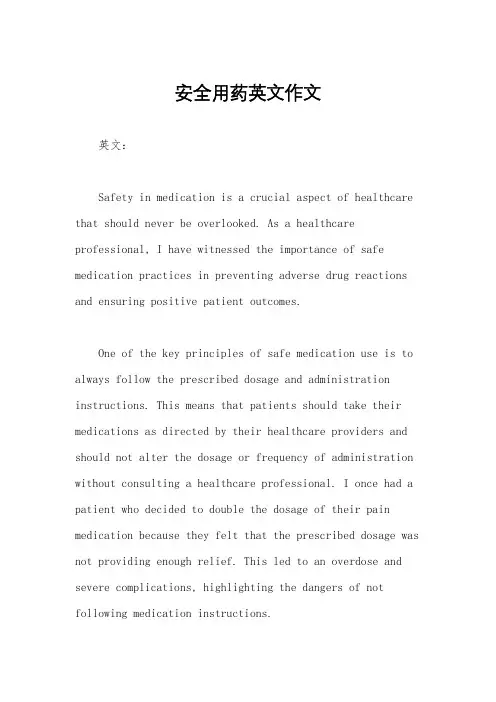
安全用药英文作文英文:Safety in medication is a crucial aspect of healthcare that should never be overlooked. As a healthcare professional, I have witnessed the importance of safe medication practices in preventing adverse drug reactions and ensuring positive patient outcomes.One of the key principles of safe medication use is to always follow the prescribed dosage and administration instructions. This means that patients should take their medications as directed by their healthcare providers and should not alter the dosage or frequency of administration without consulting a healthcare professional. I once had a patient who decided to double the dosage of their pain medication because they felt that the prescribed dosage was not providing enough relief. This led to an overdose and severe complications, highlighting the dangers of not following medication instructions.Another important aspect of safe medication use is to be aware of potential drug interactions. Certain medications can interact with each other and cause adverse effects, so it is crucial for patients to inform their healthcare providers about all the medications, including over-the-counter drugs and supplements, that they are taking. I remember a case where a patient experienced severe bleeding after taking a new prescription medication while also using an over-the-counter blood thinner. This could have been avoided if the patient had disclosed all their medications to their healthcare provider.Furthermore, it is essential to store medications properly to maintain their effectiveness and prevent accidental ingestion by children or pets. Medications should be kept in their original containers, away from moisture and direct sunlight, and out of reach of children.I once had a patient who stored their medications in a pill organizer without labels, and their grandchild accidentally ingested the wrong medication, leading to a medical emergency.In addition to these principles, patients should also be educated about the potential side effects of their medications and when to seek medical attention. It is important for patients to be proactive in monitoring their own health and recognizing any unusual symptoms that may indicate an adverse drug reaction.中文:用药安全是医疗保健中一个至关重要的方面,绝不能忽视。
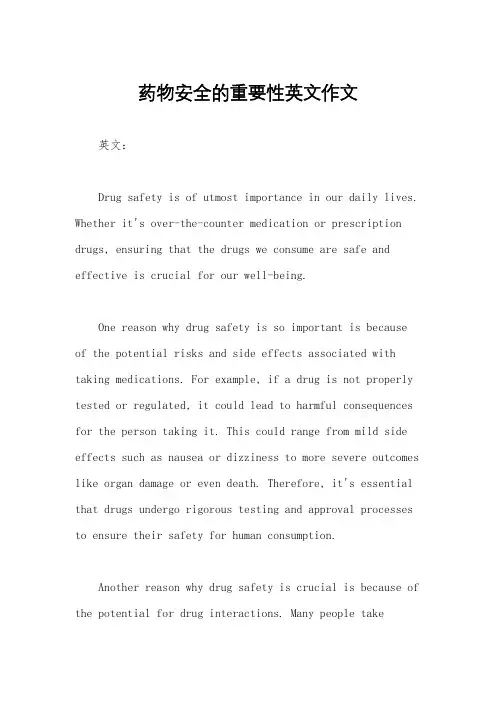
药物安全的重要性英文作文英文:Drug safety is of utmost importance in our daily lives. Whether it's over-the-counter medication or prescription drugs, ensuring that the drugs we consume are safe and effective is crucial for our well-being.One reason why drug safety is so important is because of the potential risks and side effects associated with taking medications. For example, if a drug is not properly tested or regulated, it could lead to harmful consequences for the person taking it. This could range from mild side effects such as nausea or dizziness to more severe outcomes like organ damage or even death. Therefore, it's essential that drugs undergo rigorous testing and approval processes to ensure their safety for human consumption.Another reason why drug safety is crucial is because of the potential for drug interactions. Many people takemultiple medications for various health conditions, and if these drugs interact in a negative way, it could lead to serious health complications. For instance, a person taking blood thinners and then also taking a pain reliever that thins the blood could result in excessive bleeding and other dangerous outcomes. Therefore, it's important for healthcare providers to be aware of all the medications a person is taking to prevent harmful interactions.In addition to the potential risks and interactions, drug safety is important because it impacts public health on a larger scale. For example, if a contaminated drug enters the market and is distributed to a large number of people, it could lead to a widespread health crisis. This not only affects the individuals taking the drug, but also puts a strain on healthcare resources and can lead to public panic and distrust in the healthcare system.In conclusion, drug safety is essential for our well-being and the overall health of society. It's important for individuals to be informed about the medications they are taking and for healthcare providers to closely monitor andregulate the drugs being prescribed. By prioritizing drug safety, we can ensure that the medications we rely on are safe, effective, and beneficial for our health.中文:药物安全对我们的日常生活至关重要。
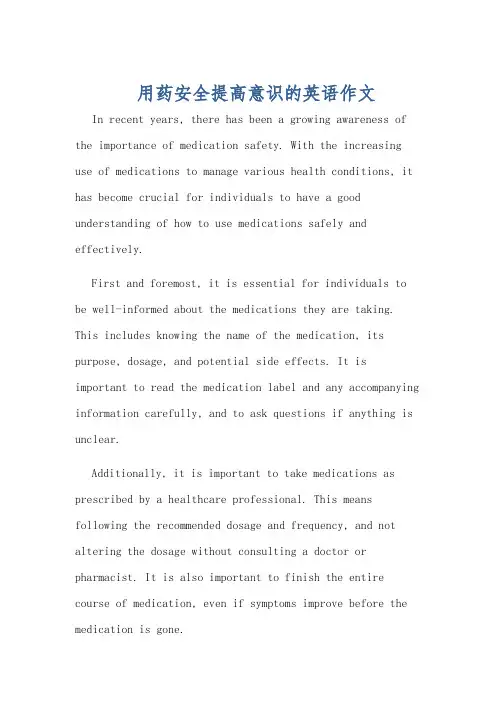
用药安全提高意识的英语作文In recent years, there has been a growing awareness of the importance of medication safety. With the increasing use of medications to manage various health conditions, it has become crucial for individuals to have a good understanding of how to use medications safely and effectively.First and foremost, it is essential for individuals to be well-informed about the medications they are taking. This includes knowing the name of the medication, its purpose, dosage, and potential side effects. It is important to read the medication label and any accompanying information carefully, and to ask questions if anything is unclear.Additionally, it is important to take medications as prescribed by a healthcare professional. This means following the recommended dosage and frequency, and not altering the dosage without consulting a doctor or pharmacist. It is also important to finish the entire course of medication, even if symptoms improve before the medication is gone.Furthermore, individuals should be aware of potential interactions between medications. It is important to inform healthcare professionals of all medications, includingover-the-counter medications and supplements, that are being taken in order to avoid harmful interactions.Proper storage of medications is also crucial for medication safety. Medications should be stored in a cool, dry place, away from direct sunlight and moisture. It is important to keep medications out of the reach of children and pets, and to properly dispose of any expired or unused medications.Finally, it is important to be aware of potential medication errors and to take steps to prevent them. This includes double-checking the medication before taking it, and seeking clarification if there are any doubts. It is also important to be vigilant for any potential sideeffects or adverse reactions, and to report these to a healthcare professional.Overall, medication safety is a critical aspect of healthcare that should not be overlooked. By being well-informed, following prescribed guidelines, and takingprecautions, individuals can ensure that they are using medications safely and effectively.近年来,人们对药物安全的重要性有了越来越多的认识。
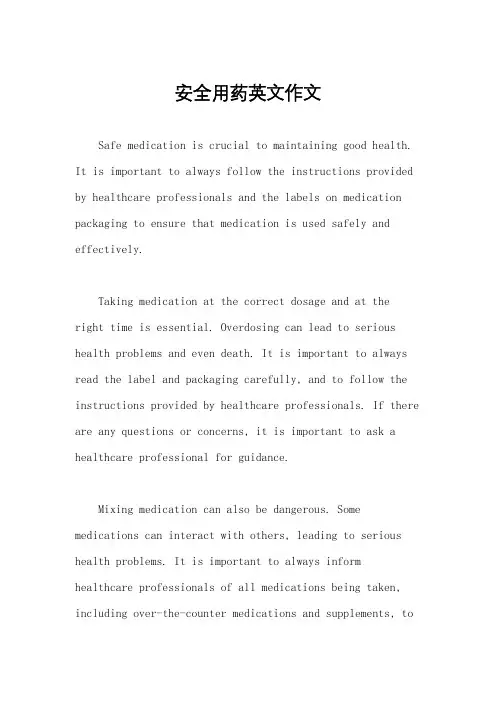
安全用药英文作文Safe medication is crucial to maintaining good health. It is important to always follow the instructions provided by healthcare professionals and the labels on medication packaging to ensure that medication is used safely and effectively.Taking medication at the correct dosage and at theright time is essential. Overdosing can lead to serious health problems and even death. It is important to always read the label and packaging carefully, and to follow the instructions provided by healthcare professionals. If there are any questions or concerns, it is important to ask a healthcare professional for guidance.Mixing medication can also be dangerous. Some medications can interact with others, leading to serious health problems. It is important to always inform healthcare professionals of all medications being taken, including over-the-counter medications and supplements, toavoid any potential interactions.Storing medication safely is also important. Medication should be kept in a cool, dry place, out of reach of children and pets. It is important to always store medication in its original packaging and to dispose of any expired or unused medication properly.In conclusion, safe medication use is vital to maintaining good health. It is important to always follow the instructions provided by healthcare professionals and the labels on medication packaging, take medication at the correct dosage and at the right time, avoid mixing medication, and store medication safely. If there are any questions or concerns, it is important to ask a healthcare professional for guidance.。
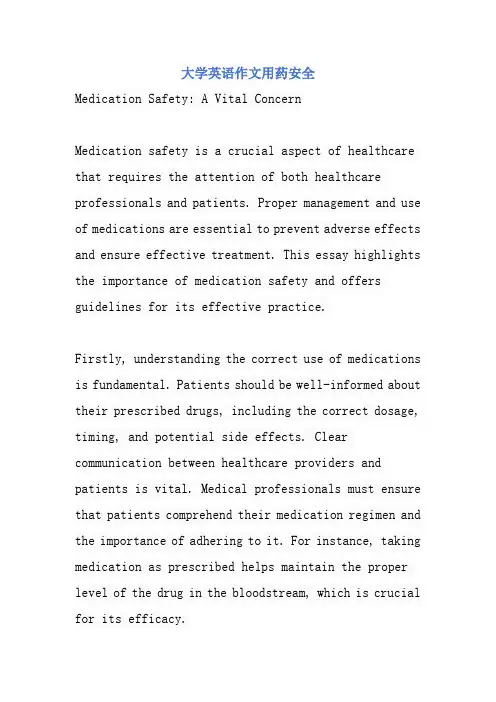
大学英语作文用药安全Medication Safety: A Vital ConcernMedication safety is a crucial aspect of healthcare that requires the attention of both healthcare professionals and patients. Proper management and use of medications are essential to prevent adverse effects and ensure effective treatment. This essay highlights the importance of medication safety and offers guidelines for its effective practice.Firstly, understanding the correct use of medications is fundamental. Patients should be well-informed about their prescribed drugs, including the correct dosage, timing, and potential side effects. Clear communication between healthcare providers and patients is vital. Medical professionals must ensure that patients comprehend their medication regimen and the importance of adhering to it. For instance, taking medication as prescribed helps maintain the proper level of the drug in the bloodstream, which is crucial for its efficacy.Secondly, it is essential to be aware of potential drug interactions. Many medications can interact with other drugs, foods, or alcohol, leading to adverse effects or reduced effectiveness. Patients should inform their healthcare providers about all the medications they are taking, including over-the-counter drugs and supplements. This transparency helps prevent harmful interactions and ensures a safer treatment plan.Moreover, proper storage of medications is often overlooked but is critical for their effectiveness. Medications should be stored according to the instructions provided, typically in a cool, dry place, away from direct sunlight. Some medications may require refrigeration, and failure to store them correctly can lead to reduced potency or adverse effects.Finally, regular review and monitoring of medication use are essential. Patients should schedule follow-up appointments with their healthcare providers to assess the effectiveness of their medications and address anyconcerns. This ongoing monitoring helps detect any issues early and allows for timely adjustments to the treatment plan.In conclusion, medication safety is a shared responsibility that involves careful consideration of medication use, awareness of potential interactions, proper storage, and regular monitoring. By adhering to these guidelines, both healthcare providers and patients can contribute to safer and more effective treatment outcomes. Prioritizing medication safety not only enhances individual health but also fosters a more effective healthcare system overall.。
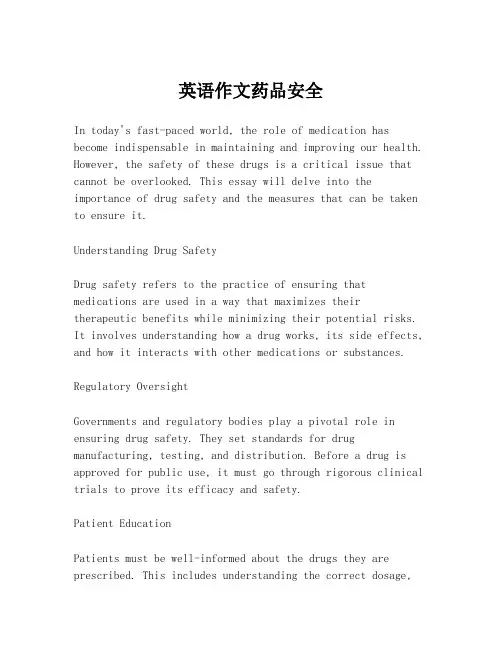
英语作文药品安全In today's fast-paced world, the role of medication has become indispensable in maintaining and improving our health. However, the safety of these drugs is a critical issue that cannot be overlooked. This essay will delve into the importance of drug safety and the measures that can be taken to ensure it.Understanding Drug SafetyDrug safety refers to the practice of ensuring that medications are used in a way that maximizes their therapeutic benefits while minimizing their potential risks. It involves understanding how a drug works, its side effects, and how it interacts with other medications or substances.Regulatory OversightGovernments and regulatory bodies play a pivotal role in ensuring drug safety. They set standards for drug manufacturing, testing, and distribution. Before a drug is approved for public use, it must go through rigorous clinical trials to prove its efficacy and safety.Patient EducationPatients must be well-informed about the drugs they are prescribed. This includes understanding the correct dosage,potential side effects, and contraindications. Doctors and pharmacists have a responsibility to educate patients and answer any questions they may have.PharmacovigilancePharmacovigilance is the science and activities relating to the detection, assessment, understanding, and prevention of adverse effects or any other drug-related problem. It is essential for ongoing monitoring of drugs even after they have been approved and are on the market.Counterfeit DrugsThe rise of counterfeit drugs is a significant threat to drug safety. These fake medications can contain incorrect dosages or harmful substances, posing serious health risks. Measures such as secure packaging, serial numbers, and authentication systems are necessary to combat this issue.Adverse Drug Reactions (ADRs)Even with stringent safety measures, adverse drug reactions can still occur. Reporting and monitoring ADRs is crucial for identifying potential safety issues and taking corrective action. Patients should be encouraged to report any unusual symptoms they experience after taking medication.ConclusionDrug safety is a multifaceted issue that requires thecollective effort of regulatory bodies, healthcare professionals, and patients. By working together, we can ensure that medications are used safely and effectively, improving the health and well-being of individuals worldwide.This essay provides a comprehensive overview of the topic, focusing on the key aspects of drug safety and the importance of a collaborative approach to ensure it.。
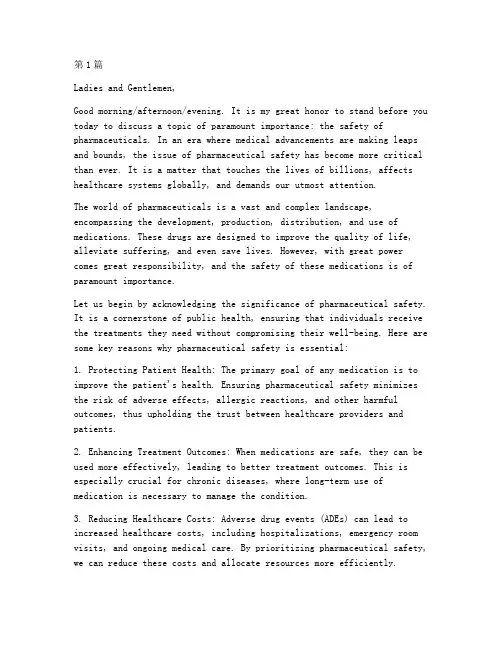
第1篇Ladies and Gentlemen,Good morning/afternoon/evening. It is my great honor to stand before you today to discuss a topic of paramount importance: the safety of pharmaceuticals. In an era where medical advancements are making leaps and bounds, the issue of pharmaceutical safety has become more critical than ever. It is a matter that touches the lives of billions, affects healthcare systems globally, and demands our utmost attention.The world of pharmaceuticals is a vast and complex landscape, encompassing the development, production, distribution, and use of medications. These drugs are designed to improve the quality of life, alleviate suffering, and even save lives. However, with great power comes great responsibility, and the safety of these medications is of paramount importance.Let us begin by acknowledging the significance of pharmaceutical safety. It is a cornerstone of public health, ensuring that individuals receive the treatments they need without compromising their well-being. Here are some key reasons why pharmaceutical safety is essential:1. Protecting Patient Health: The primary goal of any medication is to improve the patient's health. Ensuring pharmaceutical safety minimizes the risk of adverse effects, allergic reactions, and other harmful outcomes, thus upholding the trust between healthcare providers and patients.2. Enhancing Treatment Outcomes: When medications are safe, they can be used more effectively, leading to better treatment outcomes. This is especially crucial for chronic diseases, where long-term use of medication is necessary to manage the condition.3. Reducing Healthcare Costs: Adverse drug events (ADEs) can lead to increased healthcare costs, including hospitalizations, emergency room visits, and ongoing medical care. By prioritizing pharmaceutical safety, we can reduce these costs and allocate resources more efficiently.4. Strengthening Public Trust: When the public perceives the pharmaceutical industry as committed to safety, it fosters trust and confidence in the healthcare system. This is essential for maintaining public health and ensuring that individuals seek necessary medical care.Now that we understand the importance of pharmaceutical safety, let us delve into the various aspects that contribute to this crucial issue.1. Drug Development: The process of drug development is complex and involves rigorous testing and evaluation. It is crucial to ensure that medications are safe and effective before they reach the market. This includes preclinical testing, clinical trials, and regulatory approval processes.2. Quality Control: Throughout the production and distribution process, quality control measures must be in place to ensure that medications meet the required standards. This includes monitoring the manufacturing process, inspecting facilities, and testing the final product.3. Adverse Drug Event Reporting: An effective adverse drug event (ADE) reporting system is essential for identifying and addressing potential safety issues. This involves healthcare providers, patients, and pharmacists reporting any adverse effects observed during the use of a medication.4. Pharmacovigilance: Pharmacovigilance is the science of monitoring the safety of drugs after they are approved and marketed. It involves collecting, analyzing, and disseminating information on potential adverse effects, which can then be used to inform healthcare providers and patients.5. Education and Training: Healthcare professionals must be adequately trained to recognize and manage potential drug-related adverse effects. This includes ongoing education and training programs to keep them up-to-date with the latest research and guidelines.6. Patient Engagement: Patients play a vital role in ensuring pharmaceutical safety. They should be educated about their medications,including potential side effects, and encouraged to report any adverse events to their healthcare providers.To achieve a safer pharmaceutical landscape, several strategies can be implemented:1. Strengthening Regulatory Frameworks: Governments and regulatory agencies should continue to enhance the regulatory framework for drug approval and monitoring. This includes ensuring that safety is apriority throughout the drug lifecycle.2. Promoting Transparency: Transparency in the drug development and approval process is essential for maintaining public trust. This includes sharing information about clinical trials, adverse event reports, and other relevant data.3. Investing in Research and Development: Continuous investment in research and development is crucial for identifying new drugs and improving existing ones. This will lead to safer and more effective medications for patients worldwide.4. Fostering Collaboration: Collaboration between governments, regulatory agencies, pharmaceutical companies, healthcare providers, and patients is essential for achieving a safer pharmaceutical landscape. This includes sharing best practices, data, and resources.5. Encouraging Innovation: Encouraging innovation in drug development and distribution can lead to more efficient and safer medications. This includes exploring new technologies, such as personalized medicine and digital health solutions.In conclusion, the safety of pharmaceuticals is a critical issue that requires the collective effort of governments, healthcare providers, pharmaceutical companies, and patients. By prioritizing pharmaceutical safety, we can ensure that medications continue to improve the quality of life, save lives, and contribute to global health.Thank you for your attention. I encourage you to join me in advocating for a safer pharmaceutical landscape, as we work together to protect the health and well-being of future generations.[End of Speech]第2篇Ladies and gentlemen,Good morning/afternoon/evening. It is my great honor to stand before you today to discuss a topic that is of paramount importance in the healthcare sector: pharmaceutical safety. The safe use of medicines is essential for the well-being of individuals and the sustainability of healthcare systems worldwide. In this speech, I will explore the significance of pharmaceutical safety, the challenges it poses, and the measures we can take to ensure it.I. The Significance of Pharmaceutical SafetyPharmaceutical safety is the cornerstone of healthcare. When patients receive safe and effective treatments, they are more likely to recover quickly and maintain their quality of life. On the other hand, adverse drug reactions (ADRs) can lead to serious harm, increased healthcare costs, and even death. Therefore, it is crucial to prioritize pharmaceutical safety in the development, manufacturing, distribution, and use of medicines.1. Protecting Public HealthThe primary goal of pharmaceutical safety is to protect public health. By minimizing the occurrence of ADRs, we can reduce the burden on healthcare systems and ensure that patients receive the care they deserve. A safe medication supply also helps to maintain public trust in healthcare providers and pharmaceutical companies.2. Reducing Healthcare CostsADRs can lead to increased healthcare costs, including hospital admissions, prolonged hospital stays, and additional medical treatments.By focusing on pharmaceutical safety, we can prevent ADRs and, consequently, reduce healthcare costs.3. Promoting Medication AdherenceWhen patients are confident in the safety and efficacy of their medications, they are more likely to adhere to their treatment regimens. This adherence is crucial for managing chronic conditions and preventing complications.II. Challenges in Pharmaceutical SafetyDespite the importance of pharmaceutical safety, there are several challenges that we must address:1. Increasing Complexity of MedicationsThe development of new medications has become increasingly complex, with the emergence of biopharmaceuticals, personalized medicine, and combination therapies. This complexity makes it more challenging to ensure the safety of these novel treatments.2. Limited Access to InformationHealthcare professionals and patients often lack access to comprehensive information about the benefits and risks of medications. This lack of information can lead to inappropriate prescribing, poor medication management, and increased ADRs.3. counterfeit MedicationsCounterfeit medications pose a significant threat to pharmaceutical safety. These fake drugs can contain incorrect ingredients, doses, or even harmful substances, leading to serious harm or death.III. Measures to Ensure Pharmaceutical SafetyTo address the challenges in pharmaceutical safety, we must implement a multi-faceted approach:1. Strengthening Regulatory OversightRegulatory authorities must enforce strict guidelines for the development, manufacturing, and distribution of medicines. This includes rigorous testing, approval processes, and post-market surveillance to monitor for ADRs.2. Improving Information SharingHealthcare professionals, patients, and pharmaceutical companies must collaborate to ensure that accurate and up-to-date information about medications is readily available. This can be achieved through educational programs, clinical guidelines, and medication information databases.3. Enhancing Medication Monitoring and SurveillancePharmaceutical companies, healthcare providers, and patients should report ADRs to regulatory authorities. This reporting helps to identify potential safety issues and prompt appropriate action.4. Fostering Innovation in Pharmaceutical SafetyInvesting in research and development to improve pharmaceutical safety is crucial. This includes developing new technologies for drug testing, monitoring, and surveillance, as well as exploring alternative methods for medication delivery.5. Promoting Patient EngagementPatients should be actively involved in their medication management, including understanding the benefits and risks of their treatments. Patient education programs and support groups can help patients make informed decisions about their healthcare.In conclusion, pharmaceutical safety is a critical aspect of healthcare that requires the attention and cooperation of all stakeholders. By addressing the challenges and implementing effective measures, we can ensure that patients receive safe and effective treatments, leading to improved health outcomes and a more sustainable healthcare system.Thank you for your attention, and I welcome any questions or commentsyou may have.第3篇Ladies and gentlemen,Good morning/afternoon/evening. It is an honor to stand before you today to discuss a topic that is of paramount importance in the healthcare sector: medication safety. The world of medicine has advanced by leaps and bounds, bringing with it a myriad of life-saving treatments and cures. However, with this progress comes the responsibility to ensurethat these medications are safe for use. In this speech, I willhighlight the significance of medication safety, its challenges, and the strategies to promote it.I. IntroductionMedication safety refers to the prevention of adverse drug events (ADEs), which are preventable harm to a patient resulting from medication use. ADEs can occur at any stage of the medication use process, from prescribing to administration, to monitoring, and even during thepatient's self-medication. The importance of medication safety cannot be overstated, as it directly impacts patient outcomes, healthcare costs, and the overall quality of care.II. The Significance of Medication SafetyA. Patient OutcomesThe primary objective of medication safety is to ensure that patients receive the correct medication, at the right dose, and for the appropriate duration. When medication safety is compromised, patients may experience adverse drug reactions (ADRs), which can range from mild to severe, and in some cases, even fatal. By prioritizing medication safety, we can reduce the occurrence of ADRs, thereby improving patient outcomes and quality of life.B. Healthcare CostsMedication errors can lead to prolonged hospital stays, increased healthcare costs, and the potential for legal action against healthcare providers. Ensuring medication safety can help reduce these costs by preventing ADEs and minimizing the need for additional medical interventions.C. Quality of CareA healthcare system that prioritizes medication safety demonstrates a commitment to patient care and the well-being of society. By minimizing errors and ADRs, healthcare providers can enhance the quality of care, build trust with patients, and contribute to a healthier community.III. Challenges in Medication SafetyA. Complexity of MedicationsThe increasing complexity of medications, including the introduction of generic drugs, biologics, and combination therapies, poses a significant challenge to medication safety. Healthcare providers must stay abreast of the latest developments and ensure that they are prescribing and administering medications correctly.B. Communication BarriersEffective communication between healthcare providers, pharmacists, and patients is crucial for medication safety. However, language barriers, lack of awareness, and miscommunication can lead to medication errors.C. Resource ConstraintsLimited resources, such as staffing shortages and inadequate training, can hinder the implementation of medication safety measures. Ensuring that healthcare providers have access to the necessary resources is essential for promoting medication safety.IV. Strategies to Promote Medication SafetyA. Education and TrainingInvesting in education and training for healthcare providers, pharmacists, and patients is essential for promoting medication safety. Continuous learning ensures that professionals are up-to-date with the latest guidelines and best practices.B. Standardization of ProcessesStandardizing medication-related processes, such as prescribing, dispensing, and administration, can help reduce errors and ensure consistency in patient care.C. Technology UtilizationLeveraging technology, such as electronic health records (EHRs), barcoding systems, and clinical decision support tools, can improve medication safety by minimizing the risk of errors and facilitatingbetter communication between healthcare providers.D. Patient EngagementEmpowering patients to take an active role in their healthcare can enhance medication safety. Educating patients about their medications, providing clear instructions, and encouraging them to ask questions can help prevent ADEs.E. Continuous Monitoring and ImprovementRegular monitoring of medication safety initiatives and the implementation of a culture of continuous improvement are essential for identifying and addressing gaps in the system.V. ConclusionMedication safety is a critical component of healthcare that requiresthe collective effort of healthcare providers, pharmacists, and patients. By addressing the challenges and implementing effective strategies, we can create a safer and more reliable healthcare system. Let us work together to ensure that medication safety remains a top priority andthat patients receive the highest quality of care.Thank you for your attention, and I welcome any questions you may have regarding medication safety.。
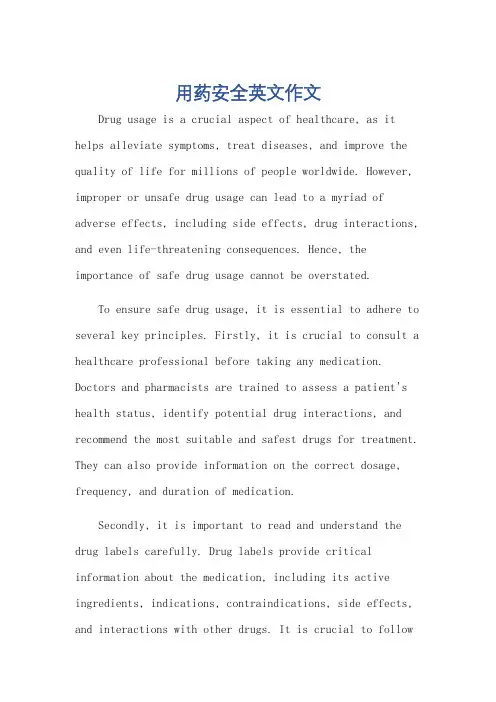
用药安全英文作文Drug usage is a crucial aspect of healthcare, as it helps alleviate symptoms, treat diseases, and improve the quality of life for millions of people worldwide. However, improper or unsafe drug usage can lead to a myriad of adverse effects, including side effects, drug interactions, and even life-threatening consequences. Hence, the importance of safe drug usage cannot be overstated.To ensure safe drug usage, it is essential to adhere to several key principles. Firstly, it is crucial to consult a healthcare professional before taking any medication. Doctors and pharmacists are trained to assess a patient's health status, identify potential drug interactions, and recommend the most suitable and safest drugs for treatment. They can also provide information on the correct dosage, frequency, and duration of medication.Secondly, it is important to read and understand the drug labels carefully. Drug labels provide critical information about the medication, including its active ingredients, indications, contraindications, side effects, and interactions with other drugs. It is crucial to followthe instructions on the label exactly, as taking more or less than the recommended dosage can lead to adverse effects.Thirdly, it is essential to store drugs safely. Medications should be stored in a cool, dry place, away from direct sunlight. They should also be kept out of the reach of children and pets to prevent accidental ingestion. Additionally, expired drugs should be disposed of properly to avoid their misuse or ingestion by others.Lastly, it is important to be aware of potential drug interactions. Taking multiple medications at the same time can increase the risk of drug interactions, which can lead to adverse effects. Therefore, it is crucial to inform your healthcare provider about all the drugs you are taking, including prescription medications, over-the-counter drugs, and herbal supplements.In conclusion, safe drug usage is crucial for maintaining good health and preventing adverse effects. By consulting healthcare professionals, reading drug labels carefully, storing drugs safely, and being aware ofpotential drug interactions, we can ensure that we areusing medications safely and effectively.**用药安全的重要性**用药是医疗保健的重要方面,因为它有助于缓解症状、治疗疾病,并提高全球数百万人的生活质量。
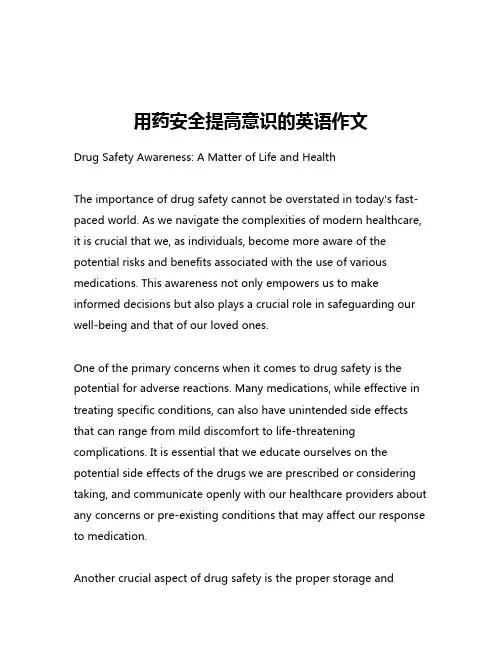
用药安全提高意识的英语作文Drug Safety Awareness: A Matter of Life and HealthThe importance of drug safety cannot be overstated in today's fast-paced world. As we navigate the complexities of modern healthcare, it is crucial that we, as individuals, become more aware of the potential risks and benefits associated with the use of various medications. This awareness not only empowers us to make informed decisions but also plays a crucial role in safeguarding our well-being and that of our loved ones.One of the primary concerns when it comes to drug safety is the potential for adverse reactions. Many medications, while effective in treating specific conditions, can also have unintended side effects that can range from mild discomfort to life-threatening complications. It is essential that we educate ourselves on the potential side effects of the drugs we are prescribed or considering taking, and communicate openly with our healthcare providers about any concerns or pre-existing conditions that may affect our response to medication.Another crucial aspect of drug safety is the proper storage anddisposal of medications. Improper storage, such as leaving medications in a hot car or exposing them to direct sunlight, can alter the chemical composition of the drug and render it less effective or even dangerous. Additionally, the improper disposal of medications can have significant environmental consequences, as these substances can contaminate waterways and soil, ultimately affecting the health of our communities and the planet as a whole.Polypharmacy, the use of multiple medications simultaneously, is another area of concern when it comes to drug safety. While some individuals may require a combination of medications to manage complex health conditions, the potential for drug interactions and adverse effects increases exponentially. It is crucial that we work closely with our healthcare providers to ensure that any medications we are taking are compatible and that the potential benefits outweigh the risks.Adherence to medication regimens is also a crucial aspect of drug safety. Failing to take medications as prescribed, whether due to forgetfulness, cost concerns, or personal beliefs, can have serious consequences for our health. Non-adherence can lead to worsening of symptoms, increased risk of hospitalization, and even the development of drug-resistant strains of diseases. It is essential that we develop strategies to ensure that we consistently take our medications as directed, such as setting reminders, using pillorganizers, and communicating any challenges or concerns with our healthcare providers.Lastly, the issue of drug safety extends beyond the individual level and into the realm of public health. Governments, healthcare organizations, and pharmaceutical companies have a responsibility to ensure the safety and efficacy of the drugs they produce, distribute, and regulate. This includes rigorous testing, transparent reporting of adverse events, and the implementation of robust safety protocols throughout the entire drug development and distribution process.In conclusion, the importance of drug safety awareness cannot be overstated. By educating ourselves, communicating openly with our healthcare providers, and taking an active role in the management of our medication regimens, we can play a crucial role in safeguarding our health and the health of our communities. Through collective efforts, we can create a safer and more informed society when it comes to the use of medications, ultimately leading to better health outcomes for all.。
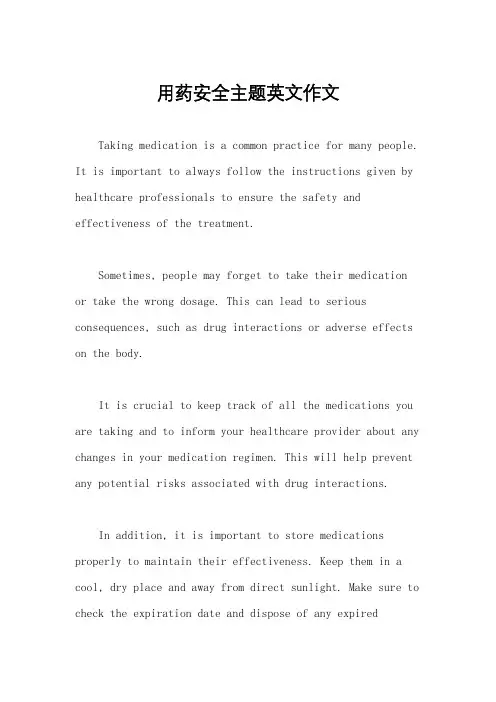
用药安全主题英文作文Taking medication is a common practice for many people. It is important to always follow the instructions given by healthcare professionals to ensure the safety and effectiveness of the treatment.Sometimes, people may forget to take their medication or take the wrong dosage. This can lead to serious consequences, such as drug interactions or adverse effects on the body.It is crucial to keep track of all the medications you are taking and to inform your healthcare provider about any changes in your medication regimen. This will help prevent any potential risks associated with drug interactions.In addition, it is important to store medications properly to maintain their effectiveness. Keep them in a cool, dry place and away from direct sunlight. Make sure to check the expiration date and dispose of any expiredmedications.If you experience any unusual symptoms after taking medication, it is important to seek medical attention immediately. Do not ignore any warning signs, as they could be an indication of a serious reaction to the medication.In conclusion, medication safety is a top priority for everyone. By following the instructions provided by healthcare professionals, keeping track of medications, storing them properly, and seeking help when needed, we can ensure the safe and effective use of medication.。
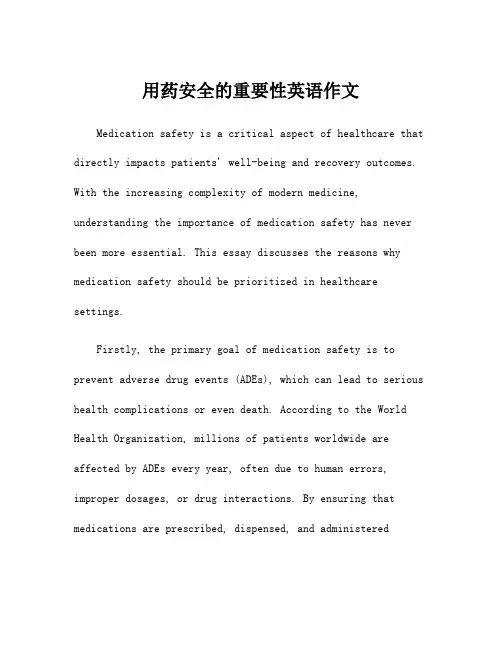
用药安全的重要性英语作文Medication safety is a critical aspect of healthcare that directly impacts patients' well-being and recovery outcomes. With the increasing complexity of modern medicine, understanding the importance of medication safety has never been more essential. This essay discusses the reasons why medication safety should be prioritized in healthcare settings.Firstly, the primary goal of medication safety is to prevent adverse drug events (ADEs), which can lead to serious health complications or even death. According to the World Health Organization, millions of patients worldwide are affected by ADEs every year, often due to human errors, improper dosages, or drug interactions. By ensuring that medications are prescribed, dispensed, and administeredcorrectly, healthcare providers can significantly reduce these occurrences and enhance patient safety.Secondly, medication safety is vital for promotingpatient trust in the healthcare system. Patients rely on healthcare professionals to provide them with safe and effective treatments. When incidents of medication errors occur, it not only jeopardizes patient safety but also undermines their confidence in healthcare providers. By implementing rigorous protocols and educating patients about their medications, healthcare systems can empower individuals to take an active role in their treatment, fostering aculture of safety and shared responsibility.Moreover, medication safety is essential for optimizing therapeutic outcomes. Many patients have chronic conditions that require long-term medication regimens. Incorrect dosing or inappropriate medication choices can lead to ineffective treatment, resulting in disease progression or complications.On the other hand, ensuring that patients receive the correct medications at the right dosages will maximize the chances of successful treatment and improve patients' quality of life.Additionally, the rise of polypharmacy, particularly among older adults, heightens the need for medication safety. As patients age, they often take multiple medications simultaneously, increasing the risk of drug interactions and side effects. Healthcare providers must conduct regular reviews of patient medications and make adjustments as needed to ensure that each drug is appropriate for the patient's current health status.In conclusion, medication safety is of paramount importance in healthcare. It protects patients from adverse drug events, fosters trust in the healthcare system, optimizes treatment outcomes, and addresses the challenges posed by polypharmacy. Therefore, it is crucial for healthcare professionals to prioritize medication safety byadhering to established protocols, engaging in continuous education, and promoting a culture of open communication with patients. By doing so, we can ensure that medications enhance health rather than hinder it, ultimately paving the way for a safer and more effective healthcare environment.。
The Importance of Medication SafetyIn the intricate landscape of healthcare, medication safety stands as a cornerstone, ensuring that the remedies we seek to heal us do not inadvertently cause harm. It is a multifaceted concept that encompasses proper prescribing, dispensing, administering, and monitoring of medications. The significance of medication safety cannot be overstated, as it directly impacts patient outcomes, healthcare costs, and public health at large.Firstly, medication errors are not uncommon and can have severe consequences. Mistakes can occur at any stage of the medication process, from incorrect dosing instructions by physicians to misinterpretation of labels by patients. These errors may lead to adverse drug reactions, allergic responses, drug interactions, or even fatal outcomes. Thus, emphasizing medication safety is crucial to minimize such risks and protect patients from unnecessary harm.Secondly, medication safety promotes effective treatment outcomes. When medications are used correctly, they have the potential to alleviate symptoms, manage diseases, and improve overall health. However, if used improperly, they can hinder recovery or exacerbate existing conditions. By adhering to safe medication practices, healthcare providers can ensure that patients receive the maximum benefit from their prescribed treatments.Moreover, medication safety is vital for containing healthcare costs. Medication errors can result in additional medical interventions, prolonged hospital stays, and increased healthcare utilization. These factors contribute to the financial burden on both patients and healthcare systems. By prioritizing medication safety, we can reduce these unnecessary expenses and allocate resources more efficiently.To enhance medication safety, a collaborative effort is required across all levels of the healthcare system. Physicians must be vigilant in prescribing, considering patients' medical histories, allergies, and potential drug interactions. Pharmacists play a pivotal role in dispensing medications accurately and providing clear instructions to patients. Patients themselves must also be active participants, asking questions, understanding their medication plans, and adhering to prescribed regimens.Additionally, technological advancements offer new avenues for improving medication safety. Electronic health records, medication management software, and barcode scanning systems are among the tools that can reduce errors and enhance accuracy in medication administration.In conclusion, medication safety is a fundamental aspect of quality healthcare. It safeguards patients from harm, promotes effective treatment outcomes, and contributes to the efficient use of healthcare resources. By fostering a culture of safety, embracing technological innovations, and encouraging patient engagement, we can significantly enhance medication safety and ultimately improve the well-being of society.。
用药安全作文英语Title: Navigating the Safe Use of Medications: A Comprehensive ApproachThe advent of modern medicine has been a cornerstone in the advancement of human health, offering therapeutic solutions for a myriad of ailments. However, amidst this progress lies a critical imperative—ensuring medication safety. The responsible use of medications is paramount to avoid adverse effects and promote effective healing. This essay explores the multifaceted approach to safe medication use, encompassing individual responsibility, healthcare professional guidance, and institutional policies.Understanding the significance of adhering to prescription guidelines is the foundation of medication safety. Prescriptions are not mere suggestions but precise instructions tailored to the individual's needs, based on medical assessments. Deviating from these guidelines—by skipping doses, discontinuing without consulting a physician, or self-adjusting dosages—can lead to severe health implications, including drug resistance and exacerbated conditions. Thus, strict adherence ensures thetherapeutic effectiveness of the treatment while minimizing risks associated with misuse.Equally important is the role of healthcare professionals in fostering an environment that prioritizes medication safety. Physicians, pharmacists, and nurses serve as the guardians of therapeutic practices, ensuring that patients are well-informed about their treatments. They provide essential counsel regarding dosages, potential side effects, interactions with other drugs, and dietary considerations. Moreover, they monitor patients for any adverse reactions or complications, promptly addressing concerns that may arise during the course of treatment.The concept of medication reconciliation further strengthens the safety net around patients. Upon each hospital admission and discharge, healthcare providers perform a comprehensive review of a patient's current medications. This process ensures continuity of therapy, identifies discrepancies in prescriptions, and prevents omissions or duplications that could compromise patient safety.Patient education is another pillar of medication safety.Healthcare institutions often implement educational programs that empower individuals with knowledge about their treatments. These initiatives range from informative brochures and workshops to digital platforms offering personalized guidance. By cultivating an understanding of their therapeutic regimens, patients become partners in their own health care, enhancing compliance and enabling them to recognize and report any anomalies related to their medications promptly.The implementation of stringent regulatory measures by governing bodies cannot be understated in ensuring medication safety. Regulatory agencies vigilantly oversee the production, distribution, and consumption of medications to uphold high standards. They authorize the use of drugs based on rigorous testing and continue monitoring for any adverse effects once medications are introduced to the market. Additionally, these agencies often collaborate with healthcare providers to disseminate updated information regarding medication uses and warnings, safeguarding the public against potential hazards.Institutional policies also contribute significantly tomedication safety. Healthcare facilities adopt protocols and systems, such as electronic prescribing and automated dispensing machines, which reduce human error and streamline the medication management process. These technologies ensure accurate dosages and decrease the likelihood of incorrect drug administration. Furthermore, regular audits and quality assurance assessments within these institutions maintain a focus on continuous improvement in medication safety practices.On a collective level, public health campaigns further amplify the message of medication safety. Governmental and non-governmental organizations champion initiatives that reach wide audiences, spreading awareness about the judicious use of medications. These campaigns address misconceptions, challenge misinformation, and encourage dialogue around safe medication practices.In conclusion, the responsible use of medications stands as a multi-layered endeavor, involving cooperation among individuals, healthcare professionals, educational institutions, regulatory bodies, and the broader community. Each participant plays a vital role in ensuring that medications serve their intended purpose—to heal andimprove the quality of life, devoid of undue harm. As we navigate through the complexities of modern therapeutics, embracing a comprehensive approach to medication safety is not just a responsibility but a commitment to preserving and valuing the sanctity of human health.。
合理用药英文作文范文下载温馨提示:该文档是我店铺精心编制而成,希望大家下载以后,能够帮助大家解决实际的问题。
文档下载后可定制随意修改,请根据实际需要进行相应的调整和使用,谢谢!并且,本店铺为大家提供各种各样类型的实用资料,如教育随笔、日记赏析、句子摘抄、古诗大全、经典美文、话题作文、工作总结、词语解析、文案摘录、其他资料等等,如想了解不同资料格式和写法,敬请关注!Download tips: This document is carefully compiled by theeditor. I hope that after you download them,they can help yousolve practical problems. The document can be customized andmodified after downloading,please adjust and use it according toactual needs, thank you!In addition, our shop provides you with various types ofpractical materials,such as educational essays, diaryappreciation,sentence excerpts,ancient poems,classic articles,topic composition,work summary,word parsing,copyexcerpts,other materials and so on,want to know different data formats andwriting methods,please pay attention!When taking medicine, it's important to follow the doctor's advice. Don't take more or less than what's prescribed.Sometimes you might think you know better, but it'srisky to change the dosage on your own.Also, be careful about combining different medicines. Some might not work well together.And always read the instructions on the label carefully. It can tell you a lot of important stuff.Remember, using medicine properly can make a big difference in how well it works and how safe it is.。
用药安全英文作文The Importance of Safe Drug UseSafe drug use is crucial for maintaining good health and preventing potential harm. In today's world, access to medication is easier than ever before, but it's important to remember that not all drugs are safe or effective for everyone. It is essential to follow medical advice and take only the recommended dosage of medication.Taking incorrect dosages or combining medications can lead to serious side effects or interactions that may harm your health. For instance, some drugs may interact with other medications you are taking, increasing the risk of adverse reactions. Others may not be suitable for people with certain health conditions, such as heart disease or liver disease. Therefore, it is essential to consult a healthcare professional before taking any medication. They can advise you on the most suitable drugs for your condition, the correct dosage, and any potential side effects or interactions. Additionally, it is important to keep track of your medication and ensure it is stored safely, out of reach of children and pets.In conclusion, safe drug use is essential for maintaining good health. By following medical advice, taking the correct dosage, and consulting a healthcare professional, you can ensure that your medication is both effective and safe.。
用药安全主题英文作文下载温馨提示:该文档是我店铺精心编制而成,希望大家下载以后,能够帮助大家解决实际的问题。
文档下载后可定制随意修改,请根据实际需要进行相应的调整和使用,谢谢!并且,本店铺为大家提供各种各样类型的实用资料,如教育随笔、日记赏析、句子摘抄、古诗大全、经典美文、话题作文、工作总结、词语解析、文案摘录、其他资料等等,如想了解不同资料格式和写法,敬请关注!Download tips: This document is carefully compiled by theeditor. I hope that after you download them,they can help yousolve practical problems. The document can be customized andmodified after downloading,please adjust and use it according toactual needs, thank you!In addition, our shop provides you with various types ofpractical materials,such as educational essays, diaryappreciation,sentence excerpts,ancient poems,classic articles,topic composition,work summary,word parsing,copyexcerpts,other materials and so on,want to know different data formats andwriting methods,please pay attention!Taking medication is a common practice for many people to manage their health conditions. However, it is essential to prioritize medication safety to avoid any potentialrisks or adverse effects. Here are some important points to consider:1. Follow the prescribed dosage: It is crucial to take the medication exactly as prescribed by the healthcare professional. Do not increase or decrease the dosage without consulting them. Taking more or less than the recommended amount can have serious consequences.2. Read the label carefully: Before taking any medication, make sure to read the label and instructions thoroughly. Pay attention to the recommended dosage, possible side effects, and any specific instructions, such as taking it with food or avoiding certain activities.3. Store medications properly: Keep medications in acool, dry place away from direct sunlight and out of reach of children or pets. Some medications may require refrigeration, so make sure to store them accordingly. Expired or unused medications should be disposed of properly.4. Be aware of potential interactions: Certain medications can interact with each other, causing adverse effects or reducing their effectiveness. Inform your healthcare provider about all the medications you are taking, including over-the-counter drugs, herbal supplements, or vitamins. They can advise you on any potential interactions to avoid.5. Report any side effects: If you experience any unexpected side effects after taking a medication, contact your healthcare provider immediately. They can assess the situation and determine if any adjustments need to be made to your treatment plan.6. Avoid self-medication: It is essential to consult a healthcare professional before starting any new medication.Self-medication can lead to improper diagnosis, incorrect dosage, or potential drug interactions. Always seek professional advice to ensure your safety.7. Keep a medication record: Maintain a record of all the medications you are taking, including the dosage and frequency. This will help you and your healthcare provider keep track of your treatment plan and avoid any potential errors or duplications.8. Be cautious with medication for children: Whengiving medication to children, follow the dosageinstructions specifically designed for their age and weight. Use appropriate measuring tools, such as a syringe or dropper, to ensure accurate dosing.9. Educate yourself: Stay informed about themedications you are taking. Research their potential side effects, interactions, and any precautions to take. This knowledge will empower you to make informed decisions and actively participate in your healthcare.10. Seek professional advice: If you have any doubts or concerns about your medication, do not hesitate to consult your healthcare provider. They are the best resource to address any questions or uncertainties you may have.Remember, medication safety is a shared responsibility between healthcare providers and patients. By following these guidelines and actively engaging in your healthcare, you can ensure the safe and effective use of medications.。